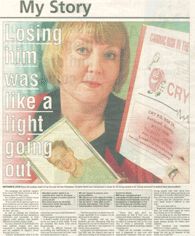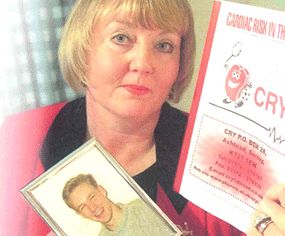A fresh call has gone out for screening to be introduced for deadly heart conditions that affect fit and healthy young people. EMMA JONES speaks to a mum and local councillor who has worked tirelessly to raise awareness of the issue following the tragic death of her son.
It was a Friday afternoon Paulette Smith will never forget for all the wrong reasons. The Swansea Valley mum-of-two didn’t hurry home after finishing work at her temporary office job in Clydach.
Her husband, Roger, a Swansea Valley Councillor, was away on business and there was no need to rush.
But when Paulette finally arrived back at her house in Heol-y-Ffin, Trebanos, about 5.30pm on that fateful April day in 1999, her life changed for ever.
A police officer was waiting outside with the news that her apparently healthy 24-year-old son, Christiaan, had been found dead.
“I remember pulling up outside my house and my neighbour come over to tell me the police had been there two or three times looking for me,” says Paulette.
I had passed a policeman parked at the side of the road. He got out of the car and he asked me my name and whether Roger was around. I said ‘no, has he been in an accident?’
He said he hadn’t and asked me if I had a son called Christiaan Smith. I remember saying ‘you can tell me anything, but don’t tell me he’s dead.”
Later, a post mortem examination would find that the former Gorseinon College student had died of a hidden heart disorder, myocarditis, which could have been picked up by a medical check.
Christiaan had must moved to Worcester in his job as a sales administrator with cleaning products manufacturer Spontex. Colleagues had raised the alarm when he failed to turn up for work on March 23. He was found dead at the foot of the stairs of is home.
Paulette was devastated but had to break the news to daughter Rebecca and deal with the awful realisation that Roger was travelling home from Stockport and planning to pay Christiann a visit en route.
“We knew the house had been taped off by police so in the end we had to tell him over the phone,” says Paulette. “It must have been a nightmare for him.”
Worcestershire coroner Victor Round said it appeared Christiaan had collapsed while trying to walk upstairs.
Consultant pathologist Paul Dunn said it appeared Christiaan had collapsed while trying to walk upstairs.
Consultant pathologist Paul Dunn said death had occurred as a result of malignant cardiac arrhythmia and lymphotic myocarditis.
“Losing Christiaan was like a light going out,” says Paulette.
“He was a fit, healthy and active young man.
“He was slim, he was a normal run-of-the-mill 24-year-old.
“We had no idea there was anything wrong. He had come to visit us for a weekend and the only thing he had was flu symptoms.
“There should be normal screening for heart conditions for everyone, like they have in Italy and the US, not just selective screening, because some people will always slip through the net.”
Figures from the Office for National Statistics indicate that 600 young people die suddenly ever year in the UK from sudden cardiac death, sometimes referred to as SADS.
Paulette, aged 60 and Roger, aged 63, now champion an awareness campaign aimed at ensuring all young people are given tests to detect any such abnormalities.
Since Christiaan’s death they have worked to raise funds for Cardiac Risk in the Young, or CRY.
The charity claims 12 people lose their lives each week across the UK from sudden cardiac death, which covers a number of conditions, and has issued a postcard highlighting the statistic, featuring a dozen victims, including Christiaan.
The charity says the 12 faces are just a ‘snap-shot’ of the problem and is working to engage support from as many MPs as possible.
This month, hundreds of postcards will be distributed by CRY families and supporters to people across Wales urging them to send it back to their local MP.
It is hoped an influx of postcards will encourage MPs to add their support to the campaign and join the Cardiac Risk in the Young All Party Parliamentary Group.
The campaign has attracted support from Gower MP Martin Caton as well as Swansea East MP Sian James.
But Clydach councillor Paulette wants to see more politicians on board.
“If you could bottle grief and give it to every politician and let them experience five minutes of it, we would not have to do any of this but unfortunately we can’t do that,” she says.
As well as helping the awards campaign, Paulette has also trained as a befriended and counsellor to help support other parents and families affected by sudden cardiac death.
CRY has a network of individuals who have suffered tragedy who have completed a counselling programme and are available to support others through their loss.
“Nobody understands what it is like unless they have lost a child themselves,” adds Paulette.
“That support network is so important – it doesn’t matter if you call up and you’re too upset to even speak. You’ve got someone who knows what you’re going through.
“It can be difficult because the counselling and befriending is usually done over the phone and you don’t have any facial expressions to go on.
“The first questions I’m asked is ‘how do I cope?’, especially it it’s a parent on the other end of the phone.
“Most counsellors will say you shouldn’t get into discussing what has happened to you but we discussed it as a group and decided it was important to answer these questions.”
CRY founder and chief executive Alison Cox, MBE, said the charity’s aim was to offer heart testing to all young people in the UK.
“Those who play sport are particularly at risk, if they carry an undetected heart condition,” she says.
“Eighty per cent of young people have no signs of symptoms and so the only way to detect a potentially sinister cardiac abnormality is by having a simple screening test,
“These are all treatable conditions and, if diagnosed in time and with appropriate treatment, lives are saved.
Young people, with their whole lives ahead of them are dying needlessly and their legacy of horrific suffering for those that love them is truly unbearable.”
Paulette says the suddenness of her son’s death made it difficult to deal with.
“You can’t deal with it.
“Roger and I said that if either of us had died, we would have coped far better than losing one of our children.
“As the years go by, you find different coping methods but you can never come to terms with it because the law of nature states parents should die before their children.
“It’s unnatural and completely different to losing a parent.
“You never, for a day or even a minute forget but you go on because of the family you’ve got left.”
Sudden cardiac death is an umbrella terms used for the many different causes of cardiac arrest in young people.
It occurs due to an electrical malfunction which disrupts the normal heart rhythm.
It can happen to anyone, even young athletes.
In about one in 20 cases of sudden cardiac death, no recognised cause can be found – even after a post mortem examination. This is then called Sudden Arrhythmic Death Syndrome (SADS).
When an unexplained and unexpected sudden death occurs, all immediate blood relatives should be evaluated by a cardiologist to fin out if they have an inherited heart disease such as a channelopathy.







